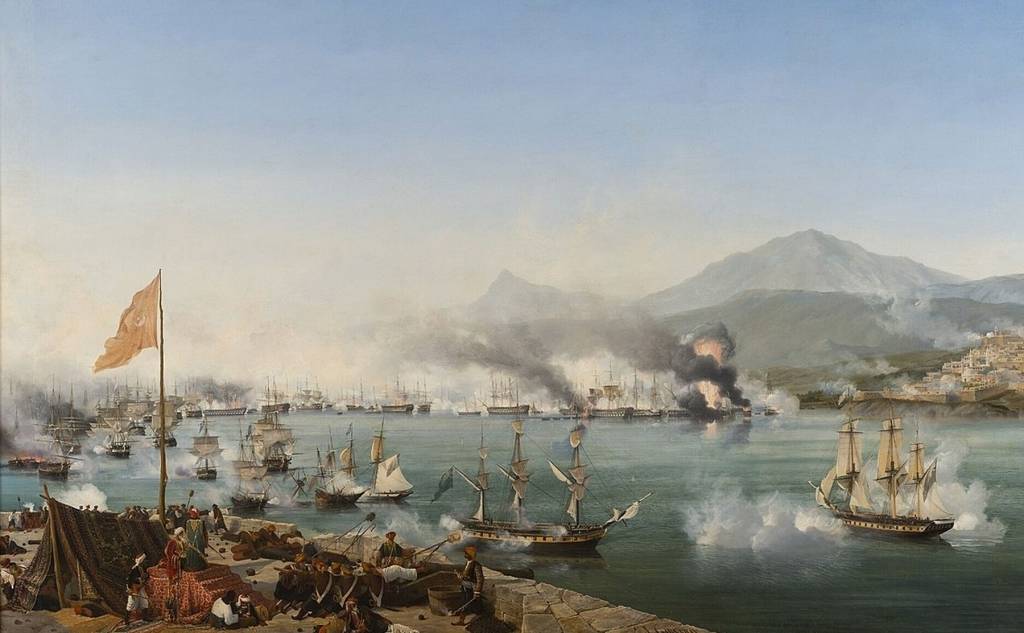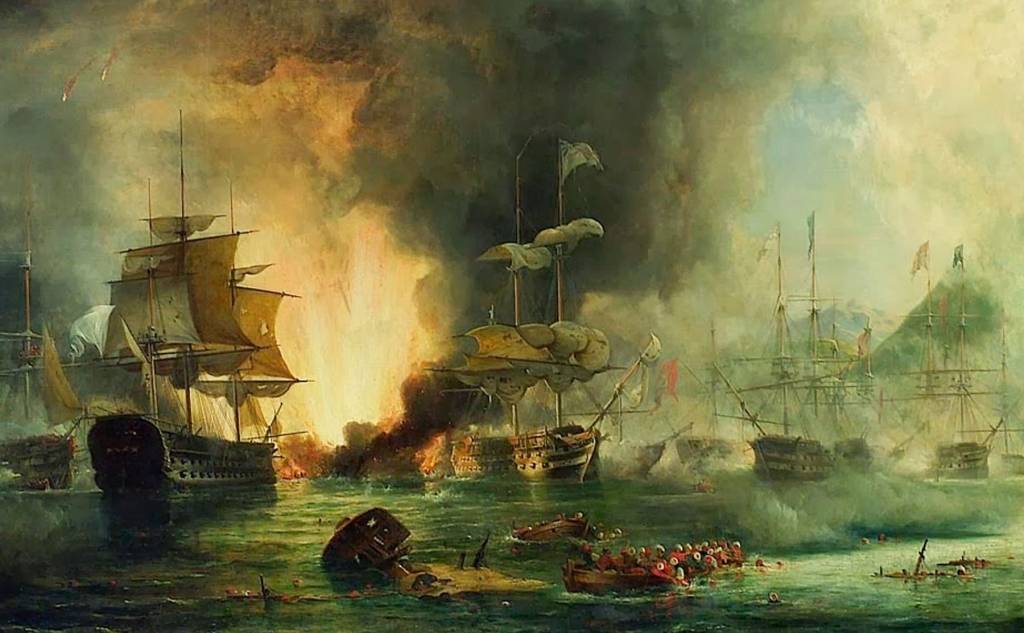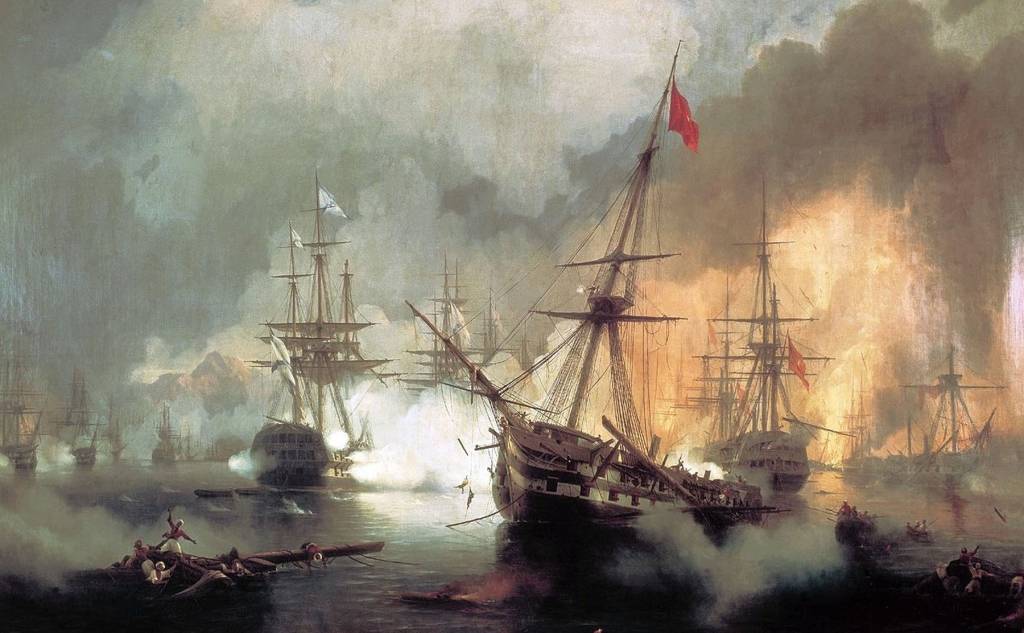The Naval battle of Navarino
THE SITUATION IN GREECE
Six years after the rebellion of the Greeks in Kalamata, while the revolution counts great victories and tragic but heroic moments, the whole of Greece, (besides a part in the Eastern Peloponnese), is again in the hands of the Ottomans with the help of the Egyptian troops of Ibrahim.
In this difficult conjuncture, the Greeks release Kolokotronis from his tiny cell in Nafplion, and he, leaving behind his imprisonment years, assumes the resistance in Mainland Greece by harassing the Ottoman troops with a form of guerilla warfare, without having the army to do anything else. Meanwhile, the Great Powers, and especially the anti-Greek Austrian diplomat Metternich, hold an indifferent to completely hostile attitude towards our country and they all know that Greece is doomed.
THE CHANGE
In this difficult conjuncture the Tsar of Russia, Alexander the First, being apathetic to the prospect of Greece’s independence, dies. His brother Nicholas who succeeds him, wishes for Russia to become a great force and, thus, to take a more active role on international issues, such as that of Greece. The British, who do not wish to leave the Russians act undisturbed, sign with them the Saint Petersburg Protocol, by which they agree to mediate between Greeks and Ottomans for an autonomous Greek state submissive, nevertheless, to the sultan. After a diplomatic backstage, France, also, joins the informal coalition of Britain-Russia.
THE OTTOMAN ATTITUDE
The sultan, who could see the clear predominance of Turkish-Egyptian troops on land, does not accept to negotiate and characterizes the Protocol as a “useless piece of paper”. This leads the three allies to sign the Treaty of London, (6th of July 1827), by which they offer to mediate between Greeks and Ottomans in order for the hostilities to end. In a secret article of the Treaty they, however, agree that if the Turkish side did not answer or accept the mediation, then the three powers would recognize the existence of the Greek state and would take all measures to end the conflicts, without, nevertheless, taking military action.
During that period Ibrahim continued terrifying the inhabitants of the Peloponnese by destroying villages and crops or sending on a daily basis many Greeks to Egypt as slaves. At the same time, the Ottoma-Egyptian fleet was planning to attack Hydra as they believed it was the main feeder of the resistance forces. The allies had no choice than sending the admirals Codrington, Derigny and Heiden to implement a peaceful exclusion in the Ottoman-Egyptian fleet which was in the bay of Navarino.
The three Admirals, who for a whole month are anchored outside Sfaktiria, receive a letter from Kolokotronis which says that the genocide of the Greeks in Messinia is in progress. They immediately send a delegation to Ibrahim in order to ask him to stop any such action. Ibrahim does not even accept meeting them and in response the allied fleet enters the Navarino bay to closely supervise the Ottoman-Egyptian one.
AND SO IT BEGINS…
At noon on October the 8th, the two big rival fleets had taken their place in the limited area of Navarino bay. The Ottoman-Egyptian fleet outnumbers with 89 warships, 8 of which are Austrian, (Metternich’s contribution). The allied fleet has only 27 ships along with its 3 flagships. The atmosphere is electrified when an Ottoman fire-ship approaches the Darmouth ship, its captain being Fellowes. He immediately sends a boat led by the lieutenant Fitzroy in order to ask for the removal of the fire-ship. The Ottomans in response kill Fitzroy and his men. At the same time the French flagship Sirene is hit by an Egyptian frigate and the British flagship Asia accepts the fire of the Ottoman flagship.
Even then, Codrington sends a delegation to the Egyptians with the message that he did not mean to collide. He only wished to force them to return to their bases, Turkey and Egypt. The Egyptians, then, kill one of Codrington’s representatives, his Greek navigator, Petros Mikelis.
HISTORY’S LAST NAVAL BATTLE
Immediately, Codrington gives the order and his flagship sinks the Egyptian one! In the closed circular bay, chaos prevailed. The two fleets exchanged intense fire for hours. The Ottomans, besides arithmetic superiority, had, also, the help of Sfaktiria’s blockhouse.
However, the allies’ experience, discipline and the great firepower of their ships determined the outcome of that day and the whole Greece.
REVIEW
At six o’clock in the afternoon in the sea of Navarino bay, they were only floating the remains of the Ottoman-Egyptian fleet. Fifteen of their eighty nine ships in total, fell on the rocks around the bay and sixty remain still at the bottom of the sea.
The world’s history recorded on that day the last naval battle in time and Greece the beginning of the modern Greek state.







